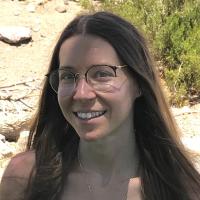
Michelle Nilan
Year Graduated:
2014
Clinical Nutritionist
Submitted:
Feb 12, 2022
Job description
I work with clients all over the world to help them heal chronic skin rashes and gut issues, primarily through analyzing and addressing dysbiosis in the gut microbiome and nutrient deficiencies. I focus on addressing root causes rather than merely alleviating symptoms.
Why did you choose this program?
I wanted to figure out how to live and what it means to live well, and when I saw the Humboldt landscape I knew this was the place to do it.
How did this program prepare you for your job?
I gained invaluable insight into the human condition and what it means to be a person engaging with the world. Chronic health issues, especially very visible, often painful, skin rashes, often come with a lot of trauma, anxiety, and depression, and the holistic way that this department approaches philosophy provided me with an intellectual foundation to engage with clients in a way that holds space for their suffering.
Finding the causes of chronic rashes is also like putting together a huge, vague puzzle, and this program gave me the intellectual tools to combine the series of seemingly random symptoms/events that can occur over a client's lifetime into a coherent picture that allows me to determine the most likely causes of their rashes. Getting this right is critical for both healing the symptoms and maintaining healthy skin and gut function long-term, and the philosophical skills I learned for logical reasoning and developing a sound argument contribute greatly to the incredible success that my clients have.
More abstractly, this program helped me along the path to answering my initial question—what it means to live well. I realized that, for me, it is vital to contribute to the world and to help others in the way that I am most suited for; utilizing my skills and interests in this capacity is a virtuous life, and it was this realization that led me to pursue my master's in human nutrition. The career I have now is my heart and life's purpose, and it was the Humboldt philosophy program that led me to pursue it.
What did you enjoy most about the program?
My professors and their expansive/inclusive approach to philosophy, as well as developing friendships and relationships with my peers. I found all of the professors incredibly open to new ideas, as well as questioning the old ones—there was always an emphasis on philosophically underrepresented groups/theories, years before it became an important sociocultural topic like it is today. The professors were all so willing to talk about ideas both during class and during office hours, and always engaged in a way that helped me think more deeply and clearly rather than make me feel inadequate or incapable (even when my initial thoughts turned out to be ultimately incoherent). A huge plus is that none of them seemed to take themselves too seriously or get wrapped up in the idea of being an authority figure; to a certain extent, my professors felt like peers that had more knowledge than me and whom I wanted to learn more from.
My peers themselves were also a huge light in this program—I found that there is a special aspect of personality that would lead someone to study philosophy at Humboldt, and although all of my peers were different from each other, they all had a certain type of openness to discussion and ideas even in the midst of vehement disagreement. I felt like I had found my tribe, a bunch of non-standard people that had somehow all congregated in one place, and developed some deep and long-lasting friendships that remain to this day.
What would you say to prospective students who are thinking about applying to this program?
The Humboldt philosophy program is a light in the world, and different from programs in other universities. I think that the environment attracts a unique type of professor and unique type of student. I also studied philosophy at a different university after I graduated and found the differences astonishing; while this other program had an equally high caliber of professors and students, I found it was overall less holistic and the worldview less expansive, with much less emphasis on non-standard/underrepresented ideas. Also, philosophy is often disregarded because it doesn't have a direct translation into a career path or financial success, but developing a high capacity for critical thinking and logical reasoning will greatly serve you in literally any path you take after graduating and enable success in any field; and, if you're like me, it will help illuminate more clearly what that path should be. Plus, engaging with ideas, with other people who also love engaging with ideas, is FUN (and so rarely occurs outside of this type of dedicated space).
